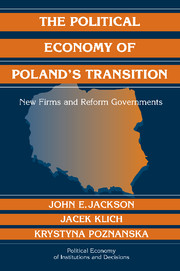Book contents
- Frontmatter
- Contents
- List of Tables
- List of Figures
- Acknowledgments
- List of Abbreviations
- 1 Why Poland?
- 2 The Dynamics of the Polish Political Economy, 1990–1997
- 3 Creative Destruction and Economic Transition
- 4 The Social and Distributional Costs of Transition
- 5 Individual Attitudes and Voting
- 6 De Novo Job Creation and Election Returns
- 7 Liberal Economic Interests and Seat Allocations
- 8 The Political Economy after 1997
- 9 The Political Economy of Transition: Why Poland?
- Appendix A Assessing Measures of New and Small Firms in Poland
- References
- Index
- Titles in the series
2 - The Dynamics of the Polish Political Economy, 1990–1997
Published online by Cambridge University Press: 07 August 2009
- Frontmatter
- Contents
- List of Tables
- List of Figures
- Acknowledgments
- List of Abbreviations
- 1 Why Poland?
- 2 The Dynamics of the Polish Political Economy, 1990–1997
- 3 Creative Destruction and Economic Transition
- 4 The Social and Distributional Costs of Transition
- 5 Individual Attitudes and Voting
- 6 De Novo Job Creation and Election Returns
- 7 Liberal Economic Interests and Seat Allocations
- 8 The Political Economy after 1997
- 9 The Political Economy of Transition: Why Poland?
- Appendix A Assessing Measures of New and Small Firms in Poland
- References
- Index
- Titles in the series
Summary
The distinguishing feature of the Polish economy during the 1990s is the high rate of job creation among new firms, which provides an important counter to the job destruction among the large state-owned enterprises existing at the start of the transition. As indicated in the previous chapter, Poland was more successful than many other transitional economies in expanding the small and medium-sized enterprise section and in creating jobs in de novo firms. We now want to elaborate on that description; consider the policies of the Polish government, taken both before and after the dramatic changes beginning in 1989, that laid the basis for this creative activity; and discuss some of their social and political implications. This chapter sets the stage for the detailed statistical analyses of the Polish economic and political transformation in subsequent chapters.
INITIAL CONDITIONS AND POLICIES
Two developments during the 1980s had important consequences for Poland's simultaneous development of a market economy and a democratic political system during the 1990s. One is the determined effort throughout the 1980s to reform the economy under the guidelines provided by the concept of market socialism. These efforts at reform left several important positive and negative legacies for the new government taking over in 1989. The other development is the emergence of a strong independent union movement, Solidarność, which became a broad-based resistance movement and eventual political party.
- Type
- Chapter
- Information
- The Political Economy of Poland's TransitionNew Firms and Reform Governments, pp. 20 - 50Publisher: Cambridge University PressPrint publication year: 2005



